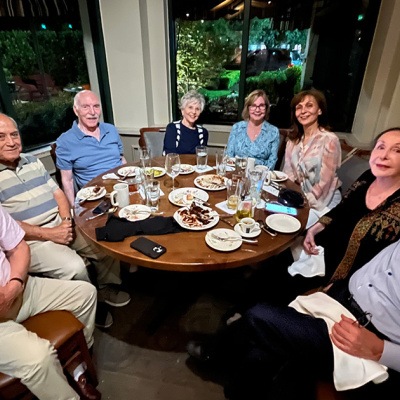These Longhorns Organized a Transformational Gift for a School in Tanzania

One thing you notice in the bustling town of Arusha, Tanzania, the tourism hub where most of the country’s luxury safari companies are headquartered, are the schoolchildren along the side of the main road. Groups of youngsters in matching uniforms walk on the shoulder of the busy thoroughfare, which is packed with jeeps and whizzing motorbikes. Often there are kids who look as young as 4 or 5 years old navigating a long stretch of road by themselves. The sight of them, bound and determined to get to school, captivated me on a transfer to Tarangire National Park, which is known for its elephants. It was the beginning of a Flying Longhorns trip to the East African country in January. As an American mother of two young kids, who has been known to pat myself on the back for my free-range parenting style when I don’t hover directly over them on the playground slide, I found the self-reliance of these children stunning.
Our Land Rover was part of a caravan of six all-terrain vehicles—each with the Texas Exes logo emblazoned across the side doors—that traversed the northeastern region of Tanzania, with its jaw-dropping natural beauty and plentiful wildlife. Highlights of our journey included the spectacular Ngorongoro Crater and Lake Maynara National Park. We followed the great migration as millions of animals moved westward toward the Serengeti plains.

For this group of seasoned travelers, many of whom had been to other African countries, this was a bucket-list expedition. They were usually giddy at the breakfast table each morning as everyone discussed which species they needed to check off for the day. Moving among the massive herds of wildebeests and zebra in the Serengeti, and quietly watching a mother and baby giraffe lurch languidly across a dirt road, not 5 feet in front of us, registered as near-spiritual experiences. What a blessing it is be alive right here, I thought to myself as we watched extended families of elephants shade themselves under massive baobab trees. It was a mantra I repeated over and over during the 12-day trek.
After several days focused entirely on the fauna, we took a break from safari life to visit the Kibaoni Primary School, near the town of Karatu. Gohagen Travel Co., the tour provider, has brought travelers here from all over the world for 25 years and started a foundation to support it in 2009. At that time, the school was overcrowded, with 788 students of all ages and just six classrooms to accommodate them. The Kibaoni Primary School Foundation was formed to fundraise for basic supplies; desks, chairs, books, and writing instruments were scarce. The school also only had one small latrine for students and staff, and no electricity or running water.

Over time, the foundation has helped the school grow into one of the most vital institutions in the region, including through a newly built administrative building and food hall. Before, students had to walk several miles roundtrip in the middle of the day to eat their lunch. As a result, parents kept children home and attendance was a major issue. Now they can count on a heaping pile of hot sorghum at school, cooked over a woodburning stove. For many of the children, it’s their only dependable meal of the day.
As we toured the school on a hot, dusty afternoon, the students, some of them sitting five to a desk, smiled and sang welcome songs to us in English and Swahili. They have a rare opportunity compared to kids their age across the country—access to a functioning school facility, and teachers and staff who are committed to breaking the cycle of poverty. One person in our group asked the school’s director why the children were all wearing their red wool sweaters on such a blistering day. “Ah,” he said. “A lot of visitors ask about these sweaters. I’m sure you noticed them on other children in the area too.” I had, in fact—in Arusha on those tiny children walking the main road. Many of them wore bulky sweaters and even coats.
“These children walk a long distance to school in the morning, and they must set out before the sun comes up. It can be very cold on that walk.” He also said that as a child in Tanzania, a school uniform is the most valuable thing you own. “You never take it off. You never want to lose your sweater.”

As we filed into our vehicles and headed back for the lodge that night, there was a palpable change in the mood of the group. The stark contrast of our own educational experiences and the experience of these children was difficult to shake. At dinner that night, we committed to pooling our resources when we were back home. “I was so inspired by the dedication of the teachers and staff,” said David Jones, BS ’68, MS ’70, Life Member. “The school is giving these children a bright future and effecting real change in the region.”
Now, just a few months later, the Kibaoni Success Fund has raised more than $8,000 to help the school repair a fourth-grade classroom and begin work on a badly needed latrine for the teachers. Participants from the same trip in past years pitched in as well. They wanted the children of Kibaoni to remember those visitors in the burnt-orange outfits who remembered them so well. Traveling always bonds a group together. But the profound connection we made with the people here, eager as we were to learn about the world, was an unexpected gift.
Photos by Mike Guerrero






